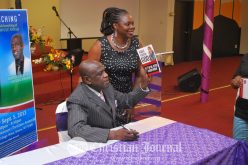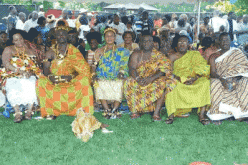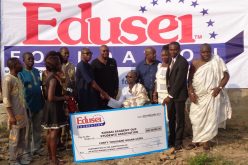
Ghanaian immigrants watched the World Cup match between Ghana and Portugal on Thursday at the Malata African Market in the Bronx. Credit Chester Higgins Jr./The New York Times
A 46-inch television, propped on a shelf next to 50-pound bags of white corn meal, was tuned to the only soccer match that mattered there: Ghana versus Portugal in the final group play match of the World Cup’s Group G.
Elsewhere in Brazil at the same time, Germany was playing the United States — each game depending on the other to determine the teams advancing to knockout round. But in this corner of the Bronx, the televisions, like the loyalties of the largest Ghanaian community in New York City, were not divided.
“Ghana! Ghana, yea!” chanted the 21 men — truck drivers, parking attendants, nurses — as they crammed into the storeroom on Sheridan Avenue, off McClellan Street: the next best thing to being in Ghana.
For the next 95 minutes, this crowd in Malata (“We make you feel @home,” said the sign above the store) would provide the soundtrack for the Black Stars’ ill-fated 2014 World Cup, starting with a love song and ending in disgust and a wait-four-years sigh.
“My love is abroad. When are you coming back to Ghana?” the men crooned in Ashanti, a Ghanaian dialect, according to a translation by one of the men singing, Richard Ampomah.
“The U.S. must lose by two and Ghana has to win by two,” Albert Darko, 44, said to no one in particular, wearing the team’s red kit, with matching Ghana socks, as he sat nervously on a crate. Some of the taller observers did not have seats; they craned their necks from the doorway.
After 30 scoreless minutes of the men’s shouting at the referees and at their team’s missed opportunities, the room suddenly went dead silent. Ghana’s John Boye had scored an own-goal while trying to defend a cross.
It seemed only appropriate; Ghana was still causing its own misery. That morning, fans of the Black Stars woke to read that their top two stars, Sulley Muntari and Kevin-Prince Boateng, were suspended from the team because of arguments with team officials and the coach. And this came the day after players threatened to boycott the game when they were not paid. The country’s president had $3 million in promised appearance fees flown to Brazil. Earlier there had been allegations of match-fixing involving Ghana’s soccer federation.
Patrick Donkor, 30, said the row over not being paid was embarrassing.
“I took the day off, I forgot about my money to come here to watch a game,” he said on the street outside the Anokyekrom African Market, around the corner from Malata. “I know money matters. But when you play for your country, it should come from within. You should be able to feel it.”
For four magical minutes in the second half, the Black Stars felt it and the storeroom in Malata began to pulse with life — even though the cluttered space was airless, save for a feeble ceiling fan. The ESPN2 broadcast flashed the score of the other game occasionally, and when Germany scored in the 55th minute, the men let out a restrained cry.
Two minutes later in the Ghana game, Asamoah Gyan scored on a crisp header to tie at 1-1. The fans sprang out of their seats and hugged one another; one man danced, twirling the flag like a towel.
They needed another goal, but they could sense that their team was forcing its play, the defense a step behind. When Portugal’s Cristiano Ronaldo knocked in a loose ball off the failed clear from Ghana’s goalie, Fatau Dauda, in the 80th minute, the room collectively groaned.
Mr. Darko shook his head, gathered his things and promptly walked out into the sunlight. “It’s over,” he said.
Soon Ghana’s trip was officially over, with a 2-1 loss, a premature exit compared with its 2010 march to the quarterfinals.
“The whole entire Ghana is corrupt,” said Elias Afflade, 46, shouting on the sidewalk and clanging a cow bell. He said that the Ghana Football Association’s decision not to pay the players before the tournament was the deciding factor.
“They need to fix the G.F.A.; they need to fix the coach,” said Kofi Genfi-Oseikrom, 31.
But as the fans cooled their frustration and mopped their sweat, and girlfriends and relatives joined them on the sidewalks, they could take comfort in having a fallback team: the United States.
“I was born in Ghana, but I’ve been here 18 years, I was in the U.S. Army, Desert Storm,” Joel Appiah, 42, said.
Inside the popular Ghanaian restaurant Papaye, Mr. Donkor dunked his sorrows in the peanut sauce broth, eating chicken and rice balls. He sat with two fellow crew members from a moving company, all of whom had regretted taking the day off.
“I’m going with the U.S. now,” Mr. Donkor said. “Sorry, that’s my second home.”
Where will he be on Tuesday for the United States’ next game against Belgium?
“Of course,” he said, looking around the restaurant, “I’ll be here.”










